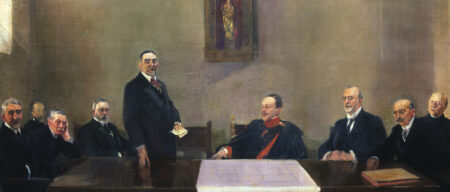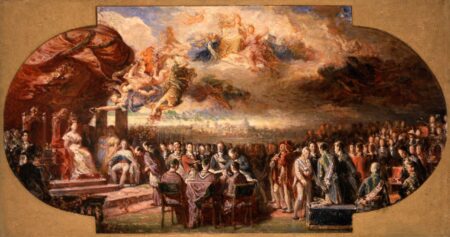
Mission Statement
The Hispanic Society of America was founded by Archer Milton Huntington in New York City on May 18, 1904, as a “free public library, museum and educational institution, containing objects of artistic, historic, and literary interest,” for the purposes of the “advancement of the study of the Spanish and Portuguese languages, literature, and history, and advancement of the study of the countries wherein Spanish and Portuguese are or have been spoken languages.”
This statement of purpose has guided the Hispanic Society through its first century.
The Board of Trustees of The Hispanic Society of America reaffirmed this statement of purpose and supplemented it with the following statement of mission on January 23, 2008.
The mission of The Hispanic Society of America is to collect, preserve, study, exhibit, stimulate appreciation for, and advance knowledge of, works directly related to the arts, literature, and history of the countries wherein Spanish and Portuguese are or have been predominant spoken languages, all in the service of the public and in accordance with the highest professional standards.
The Museum is first and foremost a repository for works of art that originate from, or are directly related to, the countries wherein Spanish and Portuguese are or have been predominant spoken languages. The Library is first and foremost a repository for manuscripts and publications that are directly related to the art, language, literature, and culture of the countries wherein Spanish and Portuguese are or have been predominant spoken languages. The mission of The Hispanic Society of America centers on and emanates from the works in its Museum and Library collections.
The term “Hispanic,” within the context of The Hispanic Society of America and its mission, encompasses the countries wherein Spanish and Portuguese are or have been spoken languages, i.e. Spain, Portugal, Latin America, the Southwest United States, the Philippines, Portuguese India, etc.
The goals of The Hispanic Society of America are to:
A. Enhance the holdings of the Museum by acquiring works of Hispanic art that are the finest and most representative of their kind from all periods of history, including the present.
B. Enhance the holdings of the Library by acquiring manuscripts and rare books of Hispanic interest, and acquiring modern publications that advance the study of Hispanic art, language, literature, and culture from all periods of history, including the present.
A. Preserve works in the collections in accordance with the highest standards of conservation.
B. Provide a safe and appropriate environment for the collections, with effective security and environmental control, for the benefit of present and future generations.
C. Ensure that preservation standards are maintained for works of art on loan, to or from the Hispanic Society.
A. Support continuing scholarly investigation and research in order to document, catalogue, and publish the collections, as well as to contribute to broader academic discourses.
B. Maintain archives, databases, and other research facilities that support the study of the collections and advance the mission of the institution.
A. Present exhibitions of works from the collections and those borrowed from other owners.
B. Facilitate access to the collections through study rooms, reading rooms, and loans to other institutions.
C. Present works from the collections in the most visually appealing and intellectually stimulating manner possible.
A. Support and encourage appreciation and understanding of Hispanic art, literature, and culture at all levels.
B. Conduct educational programs and activities for a variety of audiences to stimulate aesthetic and intellectual engagement, and to promote familiarity with Hispanic art and literature in its historical, cultural and material contexts.
C. Develop publications for a range of audiences.
D. Provide and disseminate information about the collections and programs as they relate to Hispanic art, literature, and culture, employing all appropriate means, which may include the most advanced technologies.
A. Reach out to the widest possible audience in a spirit of inclusiveness.
B. Serve the best interests of the public in every aspect of the Hispanic Society’s governance, programs, and operations.
C. Seek to increase public understanding and awareness of the Hispanic Society’s goals.
A. Aspire to excellence, meeting the highest professional, scholarly, and ethical standards in every aspect of the Hispanic Society’s governance, programs, and operations.
A. Have a Board of Trustees whose members are individually and collectively committed to ensuring the success of every aspect of the Hispanic Society’s mission.
A. Foster and support an outstanding staff at all levels and in all sectors of the institution.
B. Build and maintain a volunteer organization to support programs and activities.
C. Encourage and facilitate the professional growth, training, and development of staff and sponsor internship and other educational programs.
A. Establish and maintain superior facilities for the collections, for the public, and for the staff.
B. Ensure that galleries and public amenities are conductive to a rewarding experience to visitors.
C. Maximize use of all Hispanic Society spaces and facilities in support of the mission.
A. Meet the full programmatic needs of the institution.
B. Provide the infrastructure and support (such as staffing, salaries, maintenance, and capital and fundraising programs) necessary to maintain excellence.
C. Maintain a superior record in endowment management; balance present and future needs in endowment spending.
D. Achieve a balanced budget.




